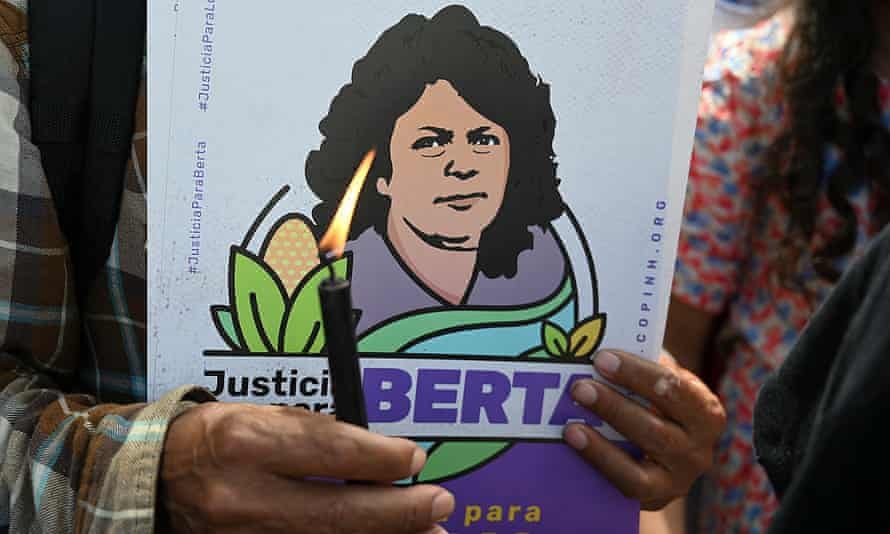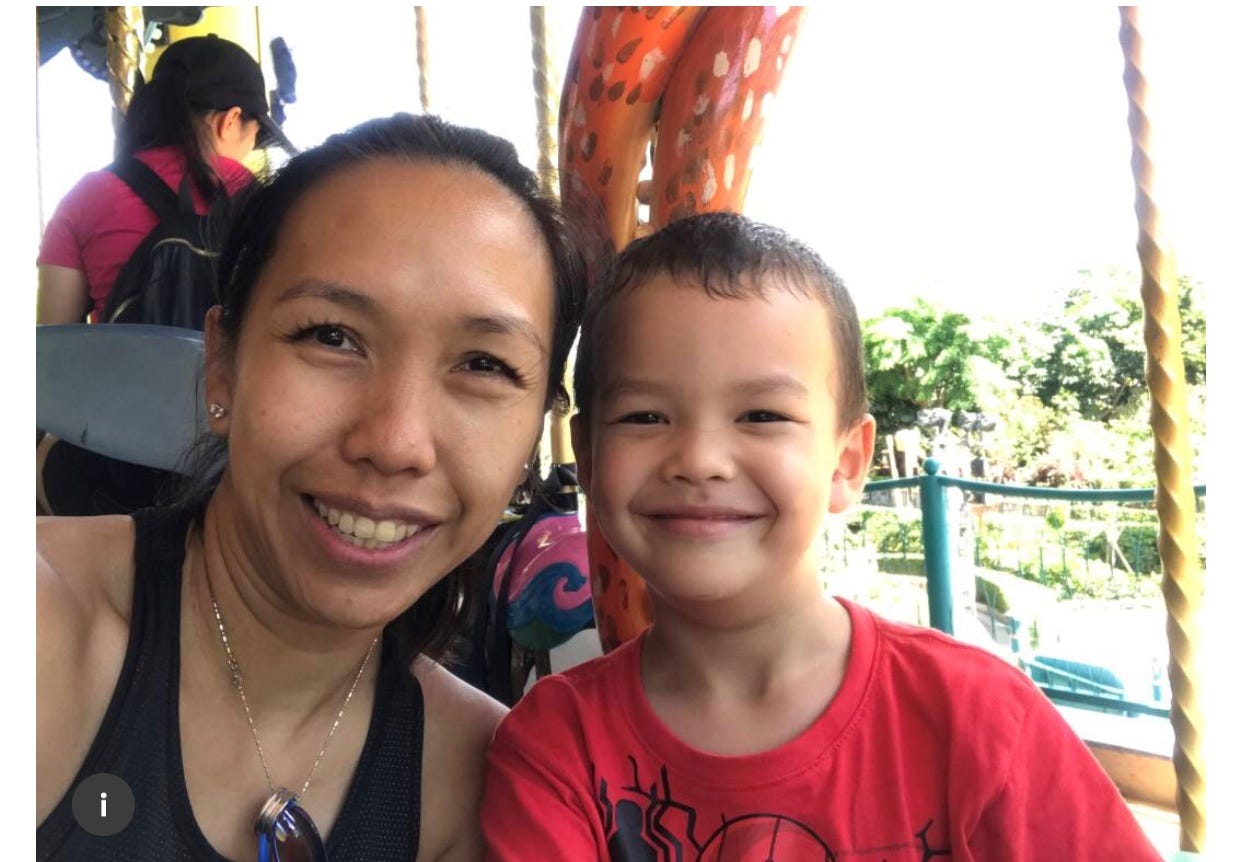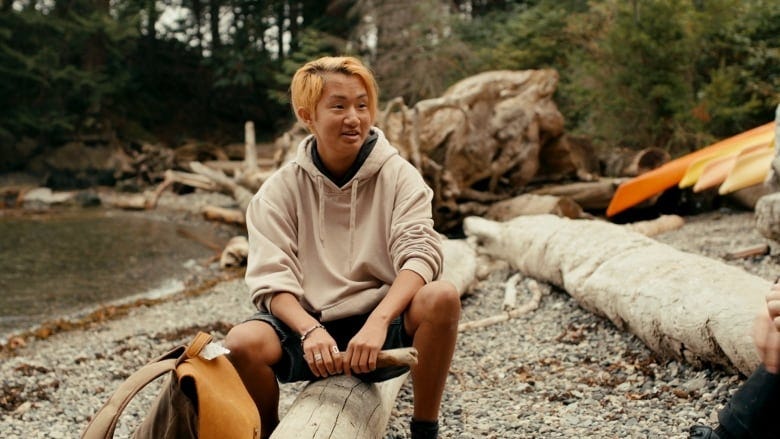Global Roundup: Indigenous Rights Activist Berta Cáceres Case, Malaysia Mothers vs Sexist Citizenship Law, Pan-African Feminist Collective, Queer Black Tattooists, Trans Teen Documents Journey on Film
Compiled by Samiha Hossain
A vigil by the indigenous rights group Copinh at the trial of Roberto David Castillo. Photograph: Orlando Sierra/AFP/Getty via The Guardian
Roberto David Castillo, the former head of the hydroelectric company Desarrollos Energéticos, has been found guilty of collaborating on the murder of environmental campaigner and Indigenous rights activist Berta Cáceres. Berta Cáceres’ daughter Bertha Zuñiga and other land defenders in Honduras are optimistic that the conviction sends a clear message that such violence is no longer acceptable.
Honduras is regularly cited as one of the most dangerous places in the world to be an environmentalist or land defender. Cáceres was murdered in 2016 after spending years opposing the construction of a hydroelectric dam in an area of western Honduras deemed sacred to the Lenca people. Honduran activists face intimidation, including harassment, smear campaigns, death threats and illegal detention. According to a new analysis, the number of incidents involving female human rights defenders rose from 203 in 2016 to 475 in 2017. IM-Defensoras states that between 2016 and 2019, 48 percent of all incidents targeting female defenders in the region occurred in Honduras.
We have to continue the fight. Our work, our struggle for justice in the case of our mother, will contribute to this important cause of ensuring there is no repetition of this kind of crime in our country. - Bertha Zuñiga
Those that are multiply marginalized are especially targeted, including Black Indigenous Garifuna people, who are fighting to save their land from drug traffickers, palm-oil magnates, and tourism developers. Women are also often the subjected to smear campaigns and sexual harassment while in police custody.
Women who dare to be defenders are completely breaking the traditional gender roles, because women are supposed to be submissive and be in the private sphere. What you’re seeing in so many of these movements … is that women are playing a very crucial role…And this is important because it means that when they experience violence ... it is actually exemplary violence that is trying to show other women what happens when you take these kinds of leadership roles that are strong, and that are associated with men. - Lydia Alpízar, co-director of IM-Defensora
Women like Zuñiga will not let justice stop at Castillo’s conviction. They are adamant that global financial institutions, the US president, and the Honduras state be held accountable. The disregard the state and institutions have for the environment is deeply troubling. It is even more troubling that the Indigenous women defending the land must worry about such rampant levels of violence and even death.
------------------------------------------------------------------------------------------------------
Choong Wai Li and her son Michael are pictured in Hong Kong in 2019. Photo supplied by Choong Wai Li via Thomson Reuters Foundation News
Six mothers have launched legal action against the government over this citizenship rule, which they say risks trapping women in abusive relationships and can leave children stateless. While Malaysian men can automatically confer citizenship to children born abroad, women do not enjoy the same right. According to lawyers, a victory could affect tens of thousands of binational families and increase pressure on other similar countries to reform their own laws.
One of the mothers, Former Malaysian squash champion Choong Wai Li, has been fighting for years to get Malaysian nationality for her seven-year-old son who was born while the family was living in Hong Kong. Malaysian women can apply for citizenship for children born overseas, but decisions often take years and rejections are common. Children like Li’s cannot access Malaysia’s right to free education and healthcare.
The global pandemic has exacerbated many of the issues and highlighted the urgency of change. Some mothers overseas are unable to return home due to entry restrictions on foreign nationals - including their children. It is also more difficult to renew visas.
Some women stay in very toxic marriages because they are so scared that if they leave then their children, not being Malaysian, won't be able to come back with them. - Choong Wai Li
The Malaysian mothers say the constitution's provisions on citizenship violate Article 8 of the constitution, which bans gender discrimination. They are seeking a declaration that mothers can pass citizenship to children born overseas and the case is expected to be heard next month.
------------------------------------------------------------------------------------------------------
Pan-African feminst and activist, Aya Chebbi. | Pan-African feminst and activist, Aya Chebbi. | Courtesy of Nala Feminist Collective via Global Citizen
Aya Chebbi is a 33-year-old Tunisian diplomat, the first ever African Union (AU) youth envoy, and the youngest appointee at the AU during her two-year term. In an interview with Global Citizen, Chebbi discusses the Nala Feminist Collective she has just launched, as well as her commitment to mobilizing young women from Africa and the diaspora to take action against issues affecting women across the continent.
Nala is the lioness, the queen. In Kiswahili (a language spoken primarily in East Africa), Nala [means] “the gift” and has many other powerful meanings in many cultures that these 17 feminists embody every day when they serve and lead. - Aya Chebbi
NalaFem was launched at the Generation Equality forum in Paris. It is a pan-African and women-led collective of 17 feminists who form the Nala Council. Members include ministers, parliamentarians, entrepreneurs, writers, artists, activists, diplomats and farmers. Their major focus is the Africa Young Women B+25 Manifesto, which includes demands for the criminalization of gender-based violence, sexual and reproductive health rights for African women, inclusive education and more.
In the last two months, NalaFem has collected 10,000+ signatures on the manifesto. They have also successfully pushed for 8 of 10 demands in the manifesto to be included in the Action Coalitions blueprint and in the Women, Peace and Security and Humanitarian Action Compact at the Generation Equality Forum.
But how [much] more trauma do we have to bear? How are we supposed to thrive when all we remember growing up is that we are social property, second-class citizens, that we are either invisible, exotic, victims or pitiful objects and that we should follow social norms that have control over our sexuality, economic power and political being…This is not just about women’s empowerment, it’s about women’s liberation, freedom and livelihoods - Aya Chebbi
NalaFem is an inspiring initiative that takes a bottom-up and grassroots approach to feminist activism. Aya Chebbi evidently believes in the power of women when they stand in solidarity together and collectively demand an end to patriarchy fuckery.
------------------------------------------------------------------------------------------------------
OGECHI IN THEIR STUDIO photo by Molly Lipson via VICE
Hannah Place is a tattooist under the name Ogechi who has founded their own pay-as-you-can tattoo practice that centres queer Black people and people of colour. When they were 19, they were refused a tattoo because their skin was “too dark”. This early experience of racism stayed with Ogechi and pushed them to look into the realities of tattooing Black and brown skin. Now, they ink their tattoos on themself.
Black and brown skin can be tattooed – in fact, tattooing can be dated back to at least ancient Egypt, and has roots in Indigenous cultures as well. However, there is a lack of understanding in the industry on how to tattoo darker skin.
I didn’t receive training in different skin tones – that doesn't happen in tattooing, from what I’ve seen, entering the industry…There is this idea that white skin is default and Black and brown skin is a specialist subject area – a lot like the approach to hair and beauty. - Minkx Doll, artist
Nish Rowe is another tattooist who uses her art and social media platform to encourage all artists to address racism in the tattoo world. She says her work is an extension of herself as a Black queer woman.
Ogechi hopes to collaborate with other artists to create a series of educational tools on Black and brown tattooing. Their work is rooted in abolition, so they prefer to tattoo using stick and poke rather than a gun. They see this method as a more decolonized approach and one that connects them to the beauty of the moment.
Photo by Molly Lipson
I tattoo for joy. I say this continuously, but it is an honour to be putting my artwork on someone's body. It's gonna be with them every day of their entire life, and there’s no other art form where that’s the case. It shouldn’t be inaccessible for anyone. – Ogechi
------------------------------------------------------------------------------------------------------
Levi: Becoming Himself follows Levi Nahirney's journey as a transgender teen. It also explores his family connections and search for identity from Canada to Vietnam. (Shannon Kaplun) via CBC
Levi Nahirney, 19, who grew up in Vancouver, Canada, is also Vietnamese, adopted and a twin. At 13, he realized he felt like a boy. This realization led him to tell his parents and twin sister and then make the decision to start his transition by taking hormones and puberty blockers.
Nahirney’s journey has been documented in the film, Levi: Becoming Himself, which airs today. The film includes a combination of interviews, home videos and footage shot by Nahirney himself.
The documentary touches on his physical and emotional transformation, the impact on his twin sister and the twins’ trip back to Vietnam to meet their birth parents for the first time. Nahirney said it was complicated to explain to his birth parents, who had given up two little girls for adoption, that he had willingly changed.
There was no word in Vietnamese for being transgender, so it was very difficult to tell them that I was transitioning into being a boy. - Levi Nahirney
Nahirney hopes that the documentary helps others like him who may be struggling.
I hope that people just realize that it's OK to go through multiple identities while finding yourself…It's OK to feel scared throughout this transition. This transition is not going to be easy whatsoever, emotionally and physically. In some parts you're going to feel disgusted with yourself and you have to remember that these feelings that you have right now are just temporary. - Levi Nahirney
————————————————————————————————————-
Samiha Hossain (she/her) is a student at the University of Ottawa. She has experience working with survivors of sexual violence in her community, as well as conducting research on gender-based violence. A lot of her time is spent learning about and critically engaging with intersectional feminism, transformative justice and disability justice.
Samiha firmly believes in the power of connecting with people and listening to their stories to create solidarity and heal as a community. She refuses to let anyone thwart her imagination when it comes to envisioning a radically different future full of care webs, nurturance and collective liberation.







